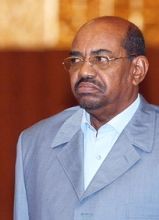Sudan’s president visit to Italy raises concern
September 13, 2007 (ROME) – Sudan’s president arrived to Italy on Thursday for meetings with Italian leaders and Pope Benedict XVI, a rare, high-profile visit to Western Europe that has raised concern from human rights advocates and some politicians.
 President Omar al-Bashir, who came to power in 1989 in a military and Islamic coup, arrives here a few weeks ahead of expected deployment of an international peacekeeping force to try to improve the security situation in the war-ravaged western region of Darfur.
President Omar al-Bashir, who came to power in 1989 in a military and Islamic coup, arrives here a few weeks ahead of expected deployment of an international peacekeeping force to try to improve the security situation in the war-ravaged western region of Darfur.
Al-Bashir opens his talks early Friday with a meeting with Italian Premier Romano Prodi in Rome, who defended the visit as a “useful” way to press Sudan to make good on its pledges concerning Darfur.
Sudanese president is then being granted a private audience with Benedict at the papal summer residence in Castel Gandolfo. That could be an opportunity for the pontiff to personally make plain his anguish over Darfur. Benedict has said the Holy See is willing to do everything possible to end what he has described as “horror” in Darfur.
Sudan, which once gave Osama bin Laden a haven, has moved away from Islamic radicalism and even become a partner in the U.S.-led war on terror. But Vatican relations with Sudan have been tense.
When Benedict met with Muslim diplomats a year ago in a bid to defuse anger over his remarks about Islam and violence, Sudan was the only predominantly Muslim nation with diplomatic relations with the Holy See that did not attend.
The Sudanese president’s trip to Italy includes “his first bilateral meeting with a European head of state for quite many years,” Sudan Foreign Ministry spokesman Ali Sadiq said.
Al-Bashir will meet with Italy’s head of state, President Giorgio Napolitano, after he returns to Rome following the talks with the pope.
“The goal of this visit is to improve the dialogue of civilizations, and the dialogue between Christianity and Islam,” the spokesman said.
Sadiq said al-Bashir would explain to the pope “what steps the government is taking to alleviate the suffering of people in southern Sudan and Darfur.”
Pope John Paul II met with al-Bashir in Khartoum in 1993, in a brief stopover which was an opportunity for the Vatican to champion the cause of Christians pressured by the Muslim-dominated government.
HUMAN RIGHTS CONCERN
But there was concern among human rights groups about what the visit would achieve.
“The human rights situation in Sudan continues to be one of the most pressing humanitarian crises in the world today, and one to which the international community has failed for far too long to provide an effective response,” Amnesty International said in a statement from its European Union office.
“Against this background, Amnesty International finds it remarkable that the Italian government has decided to receive” al-Bashir.
Twenty-seven members of the European Parliament on Thursday wrote to Prodi, accusing Italy of failing to take up a European Union call for stepped-up pressure on Sudan.
“You government has been decisively silent,” the deputies wrote.
Prodi responded to the criticism by noting that the visit comes after the U.N. Security Council unanimously voted in July to deploy a U.N.-African Union peacekeeping force for Darfur, and after the announcement of the resumption of peace talks between the government and rebels.
The visit by al-Bashir “constitutes a useful occasion to underline our common concerns and the expectations of Italy, Europe and the entire international community for the stabilization of the country and a solution to the Darfur crisis,” Prodi said in a statement.
A Darfur peace conference is scheduled to start in Libya on Oct. 27.
The head of the joint United Nations and African Union joint mission to Darfur has said that the force, with more than 26,000 troops committed by nations, could start deploying next month.
Khartoum has in the past repeatedly hindered peacekeeping or humanitarian efforts in Darfur.
More than 200,000 people have died and 2.5 million have been uprooted since ethnic African rebels in Darfur took up arms against the Arab-dominated Sudanese government in 2003.
Sudan’s government is accused of retaliating by unleashing a militia of Arab nomads known as the “janjaweed,” a charge Khartoum denies.
A 2005 peace deal, which many now fear is in trouble, between Sudan’s Muslim government in the north and the Christian and animist rebels in the south ended a 21-year civil war in the country and led to a power sharing agreement in the national government. The Darfur war is unrelated, and pits Muslims against Muslims.
(AP)
